It can't be that bad if there are birds, right? Dadaab 1
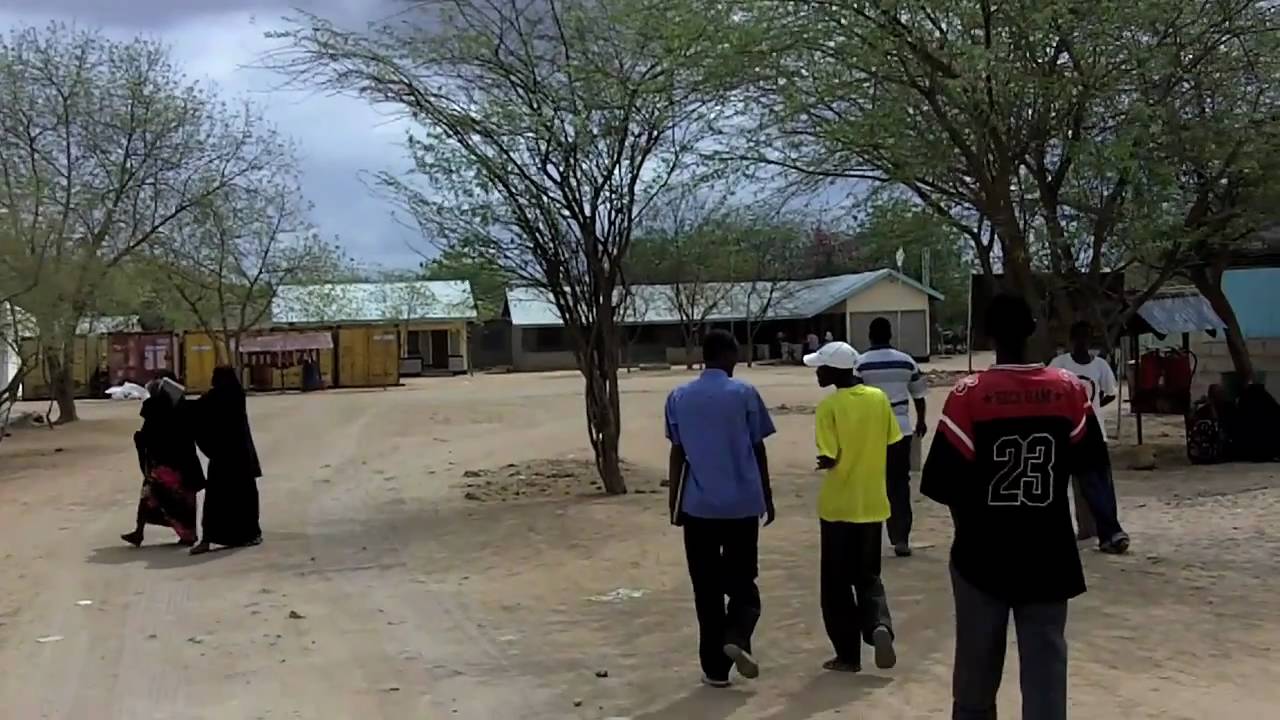
I am not yet qualified to write this post. In five days I have seen and experienced so much and yet understand almost none of it. A state of shock (due to heat, culture, exhaustion, going off caffeine, and malaria pills) means that I don’t really know how I feel or what is going on in my head. I suspect it will only begin to really hit me when I first eat that Manhattan chicken caesar salad I’m currently craving and break down. But we press on and we blog, so here goes.
I departed for Dadaab camp on Wednesday morning at 7AM, using my last kenyan shillings to buy a copy of the Economist. For the one-hour flight, I spent about 10 minutes marveling at the wonder of the African savannah and the intimacy of a propellor plane, and then 50 minutes passed out cold. The exhaustion lasted about four days.
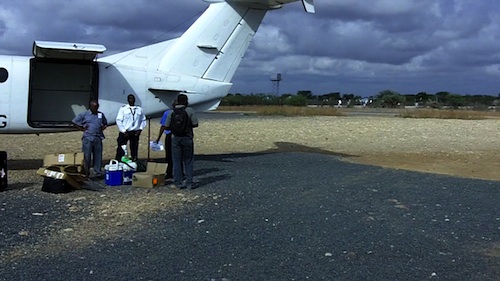
We touched down a wide open field and the plane’s passengers (most of them Italian) were greeted by various aid groups and taken away in large UN trucks with canvas-covered backs, leaving me alone on the field. The Lion King-esque trees hunkered over barren sand and I wondered what I would do if nobody came. It was at that moment that Lorreta pulled up in a canvas-covered van of her own. “Welcome to Dadaab,” she said, “are you hot yet?”
And I was. Dadaab is not as insanely hot as it’s been made out to be, but it is definitely hot. Supposedly it gets up to 110ºF.
On the way from the airport to the compound I bombarded Lorreta with questions, and after about a ten minute drive we arrived. A guard stood near the gate and let us in with display of our badge. Watch the video to see the compound: It’s about 3/4 mile on a side and surrounded by stacks of barbed wire that have grown over with weeds. The best comparison I can give is to sleepaway camp: dirt paths connect small buildings that are either offices or dormlike groups of individual rooms. It’s quite nice for what it is and very comfortable. As for food, I brought about 30kg of food from Nairobi and have been relying heavily on that and the vegetarian cafeteria at the Lutheran World Foundation next door. I can’t adjust to the staple of goat meat right now, so thank god for beans and rice.
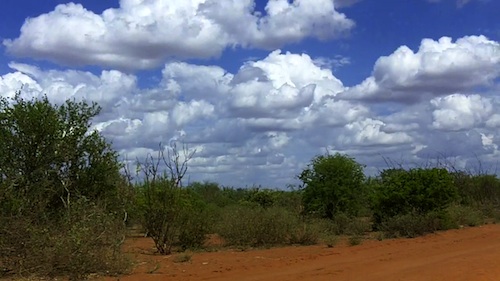
The floor of my room is a menagerie of insects – I’ve learned more about the varieties of roaches than anything so far. A few days into the trip I lay in my bed surrounded by a malaria net, taking my malaria medicine and typing on my MacBook Pro, my copy of the Economist laying on the floor, the front cover page in the trash surrounding a dead roach. I laughed at how I am, as usual, a walking caricature.
As for the refugee camp, it seems much more open that I expected. The oft-repeated fact is that 300,000 people are crammed into a camp built to hold 80,000, but I have only been on the outskirts and they seemed very spacious. It doesn’t feel right to chronicle misery that I don’t really understand yet, and trying to synthesize the few experiences I’ve had into conclusions or a story would be unjustly reductive, so I’ll just share a few experiences:
I’ve only been to the camp twice so far. I brought a ton of petty cash on the plane so we went on Wednesday afternoon to pay contracts for mule transport of equipment (yes, we transport equipment for screenings on mule-carts in Daddab.) We sat in a small meeting hall that reminded me a lot of a traditional Cherokee Indian meeting hall and is a standard design throughout the camp. A number of people filtered into the room, some affiliated with FilmAid and others not – I’m told that there is such boredom in the camp that any small thing happening draws a crowd. Some seemed quite happy, others fidgety and preoccupied. A woman, Dahabo, translated between English and Somali as they negotiated the contract and of course asked for more money. I’m one of very few white people working there (usually the only one in the room) so I attract a lot of attention; an apparently deaf man approached me, placed his hand on my thigh, and kept gesturing to his mouth and his stomach, making the international signs for money and “please.” I was frozen into inaction and kept asking Lorreta “what do I do?” I actually had no money and figured it would not be a good idea to begin handing it out to people who asked on my first day; eventually the rest of the group shooed him away.
Then a man walked in and began talking to me in perfect English, telling me he saw money being handed out and had a mind to “rob that woman” but wouldn’t because there were so many people there. I laughed uncomfortably, having absolutely no context with which to place that remark. He told me he was working with Care (the group that runs the refugee camp) and asked me about our recent election. He knew a ton about US politics; I explained to him how representation was different in the House and the Senate and he asked why there are two houses. Then he said hello to Lorreta and left.
Dahabo took us to the Somali market, which was like a scene out of Aladdin. Small kids riding mule-carts and hitting the mules with long reeds to make them go faster. Goats chasing each other. Women lying face down on prayer mats. Structures made of wood, canvas, and sheeting material with the word USA printed on it. Lorreta was searching for a stool and we went from stall to stall, uprooting their supply to find the perfect one. A crowd of about ten kids grew almost immediately and they stood, staring at me. They stared unabashedly and did not avert their eyes when I looked at them, which made this American massively uncomfortable. “Hi!” I tried many times, with the biggest smile and wave, which did not change the stares. “Salaam?” One kid spoke English and introduced himself – it looked from his body language that he was being very brave by doing so. I asked all of them their names and then the conversation fell silent. I resolved to learn some basic Somali.
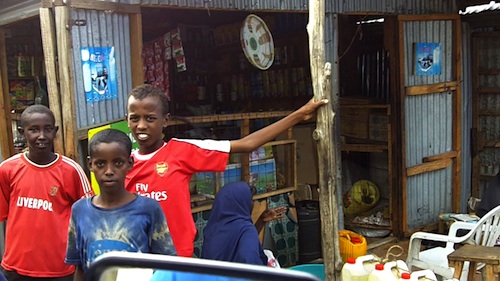
I’ve realized now that I am entertainment and something new, and am learning to ignore the stares and act naturally. Yesterday I encountered a group of five 10-year-olds on the street. The younger the kids are the better their English, and these spoke it perfectly. I racked my brain for what to ask them. It felt like an awkward blind date.
“Where do you live?”
“Over there, about 5km”
“Are you in school?”
“Yes.”
“How do you get to school?”
“By bus.”
*long pause*
“So do you live with your parents?”
“Both my parents have died.”
Oh. Right.
Some look awful, but many people in the camps speak eloquently, smile a lot, and dress well. When the reality escapes it is, for me, always a new shock.
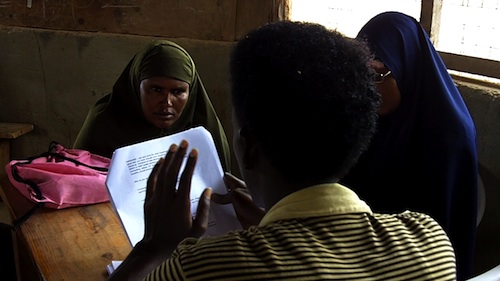
We had rehearsal yesterday for our production, “Not Me But The Law,” which will take a few weeks to film. I will be helping in the filming process and editing the film. Then I’ll be teaching a three-week course. I’m also working with a company here to rebuild the FilmAid website around what is happening on the ground and looking for more ways to improve what we do, with tech and otherwise. Hopefully I will find good luck and good grace from the mosquitos, scorpions (!!), snakes, Malaria, Dengue, Giardia, and of course Somali warriors trying to infiltrate 🙂 All we have to fight them is Malaria pills and Tusker brand beer.
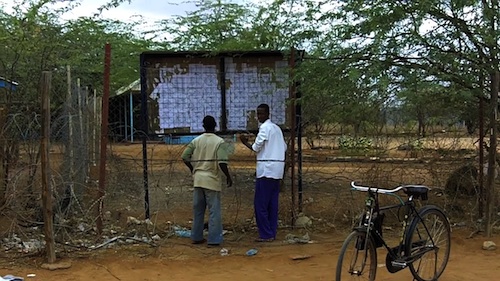
Yes there are some little tweety birds, but there are vultures everywhere.
